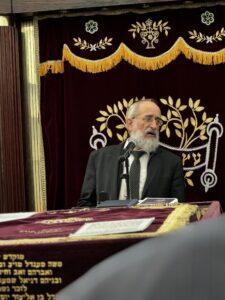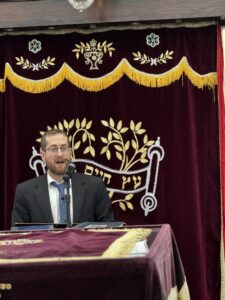Flatbush Community Gathers for Hakhel Yarchei Kallah at Agudas Yisroel of Madison
Chaim Yehuda Meyer
Members of the Flatbush Jewish community came to Agudas Yisroel of Madison (Rabbi Reisman’s shul) on the morning of December 25 for a legal holiday yarchei kallah. They heard divrei Torah, words of chizuk and brachos from a host of Rabbanim. The program began with Shacharis followed by refreshments. The event was open to both men and women.
Rabbi Yisroel Reisman, the Mara d’Asra and a Rosh Yeshivah at Yeshiva Torah Vodaas expounded on Rabbi Avigdor Miller’s explanation on accepting rebuke. Rabbi Reisman reiterated what Rabbi Miller said about retirement: don’t sit around. Daven Krias Shema b’zmano and learn. Rabbi Reisman tells talmidim who are going into the workforce to have a 15-minute seder; when they go out into the world, whether it’s for work or family events, they should always make time for Torah.

Additionally, Rabbi Reisman spoke about the need to accept rebuke. When someone tells you to learn more, do you accept it or do you lash out at them? This was the difference between the tochacha Michah gave to King Chizkiyahu and the tochacha, whereas the people didn’t listen to Yehoakim or Yirmiyah, who gave the same nevuah. This is why the edict regarding the destruction of Zion during the times of Michah was repealed by Hashem, but was unfortunately fulfilled during the times of Yirmiyah.
Rabbi Reisman stated that just as the book of Michah ends with comfort, the galus should end soon with the coming of Moshiach. We just need to have achdus. Sometimes this involves going against our nature; Yaakov Avinu knew the nature of each of his children. They had to fight their natures at times to fulfill their father’s blessings. In marriage, our partner helps us smooth out the rough edges. This is the secret to blessings. The need to make sacrifices in our day to learn Torah and combat the yetzer hara lent itself well to the words of the next speaker.

Rabbi Joey Haber, Rabbi of Magen David Synagogue and Rabbinical Director of Kesher discussed the sacrifices made by previous generations to study Torah and how we can be better people by working harder for what we believe in. For example, Rabbi Yosef Shlomo Kahaneman set out to build Ponevezh at a time when the Nazis were approaching Eretz Yisrael; he continued building without blinking an eye. Today, Ponevezh Yeshiva is a large, independent institution. When Rabbi Haber was younger, people learning in Israel would fax their relatives overseas about once a week. Today, they are facetiming three times a day. Modern comforts, such as air conditioning should of course be used; however, we should not let this detract from our learning.
That is not to say we cannot have any pleasure in this world. We all have air conditioning and heating; of course, we should use them! But when your children say, “I want this phone!” “or “I want to go on this vacation!” how do you approach that? We all need to understand that we need not do something just because we can afford it. While the standards for what is necessary are higher today, we can all make some sacrifices. And this will make us better people.
Use the pleasures and modern conveniences you have for good. This goes to the importance of the Yissacher-Zevulun relationship. These are the ideas Rabbi Eli Reisman emphasized in his remarks.
Rabbi Eli Reisman, the Rosh Chaburah of Kollel Hora’ah of Yeshiva Torah Vodaas discussed with the crowd the topic of the Yissacher and Zevulun partnership: which one is it better to be? Who gets what? How does one fulfill his half of the bargain in such a relationship?
Finally, a video presentation by Rabbi Doniel Travis was shown on the topic of Rabbi Moshe Shternbuch’s pesakim and hashkafos for the current matziv. Rabbi Travis emphasized that if we have achdus we can bring Moshiach now.
The program ended with Minchah. Guest animatedly fielded questions to the speakers who patiently waiting and talked with each one. This was a fulfilling way to spend one’s time off.
You must be logged in to post a comment.